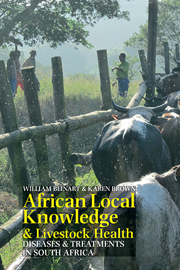Book contents
- Frontmatter
- Contents
- Acknowledgements
- Abbreviations
- Names of Common Diseases
- List of Maps, Photographs & Tables
- 1 Introduction: African Local Knowledge & Veterinary Pluralism
- 2 Ticks, Tick-borne Diseases & the Limits of Local Knowledge Introduction
- 3 ‘The Grave of the Cow is in the Stomach’: Environment & Nutrition in the Explanation & Prevention of Livestock Diseases
- 4 Transhumance, Animal Diseases & Environment
- 5 Plants & Drugs: Medicating Livestock
- 6 Medicinal Plants: Their Selection & their Properties
- 7 Animal Health & Ideas of the Supernatural
- 8 Gender, Space & the Supernatural
- 9 Conclusion
- Appendices
- Appendix 1 Recommendations
- Appendix 2 African Ideas about Diseases and Conditions Associated with the Environment
- Appendix 3 African Ideas about Supernatural Causation
- Appendix 4 Plants and Diseases
- Appendix 5 Non-Plant Remedies
- Select Bibliography
- Index
Appendix 1 - Recommendations
from Appendices
Published online by Cambridge University Press: 05 December 2013
- Frontmatter
- Contents
- Acknowledgements
- Abbreviations
- Names of Common Diseases
- List of Maps, Photographs & Tables
- 1 Introduction: African Local Knowledge & Veterinary Pluralism
- 2 Ticks, Tick-borne Diseases & the Limits of Local Knowledge Introduction
- 3 ‘The Grave of the Cow is in the Stomach’: Environment & Nutrition in the Explanation & Prevention of Livestock Diseases
- 4 Transhumance, Animal Diseases & Environment
- 5 Plants & Drugs: Medicating Livestock
- 6 Medicinal Plants: Their Selection & their Properties
- 7 Animal Health & Ideas of the Supernatural
- 8 Gender, Space & the Supernatural
- 9 Conclusion
- Appendices
- Appendix 1 Recommendations
- Appendix 2 African Ideas about Diseases and Conditions Associated with the Environment
- Appendix 3 African Ideas about Supernatural Causation
- Appendix 4 Plants and Diseases
- Appendix 5 Non-Plant Remedies
- Select Bibliography
- Index
Summary
Role of the state
Research
At present, state veterinary policy operates largely through provincial governments. Expanding adequate research capacity at a provincial level, ideally in association with academic institutions, would be valuable. An example of effective research has been at the University of Fort Hare where Patrick Masika and his team are doing work that is highly relevant to state interventions and the recording of local medical knowledge. Tony Dold and Michelle Cocks at Rhodes have developed extensive records of local medicinal plants. The University of Pretoria and the Onderstepoort Veterinary Institute have sponsored phytochemical plant research drawing on local knowledge primarily from the northern provinces. We have used their publications extensively in our chapters. However, such researchers could communicate more across disciplines and make their work more easily available to government officers and smallholders. Such a strategy would require coordination between academics and local state officers. There is a major gap in research on the efficacy of administrative intervention.
Animal Health Technicians and interaction with communities
Veterinary surgeons at a district level are a fulcrum for policy implementation, regulation of diseases, and the circulation of information about treatment. A cluster of Animal Health Technicians (AHTs) serve in each district office and provide a critical interface with the community. The system of AHTs emerged in the 1990s as an alternative to the more-centralised implementation of policy through stock inspectors and dipping foremen. AHTs received better training than their predecessors so that they could be responsive to a much wider range of problems affecting the smallholder livestock sector.
- Type
- Chapter
- Information
- African Local Knowledge and Livestock HealthDiseases and Treatments in South Africa, pp. 256 - 264Publisher: Boydell & BrewerPrint publication year: 2013



